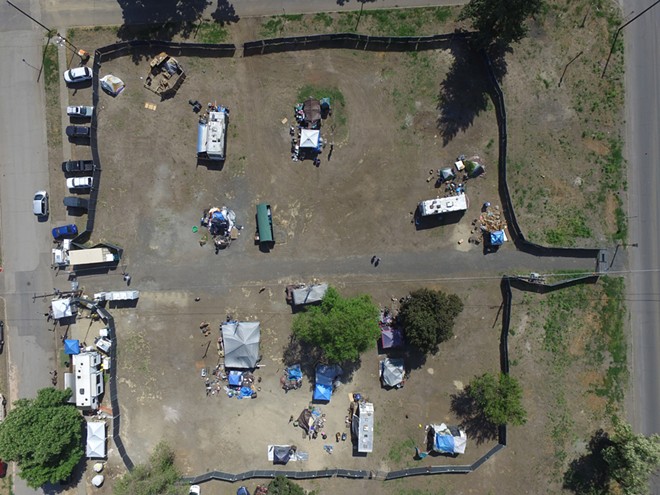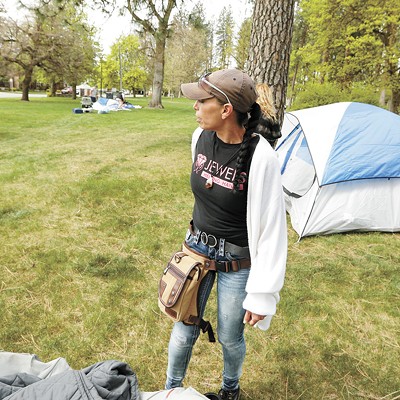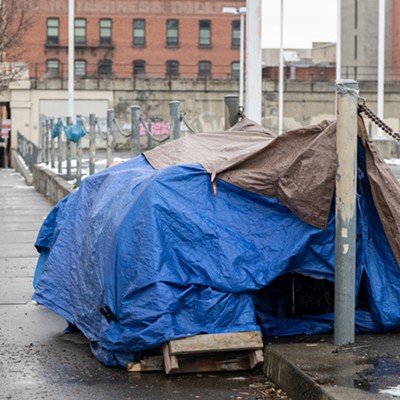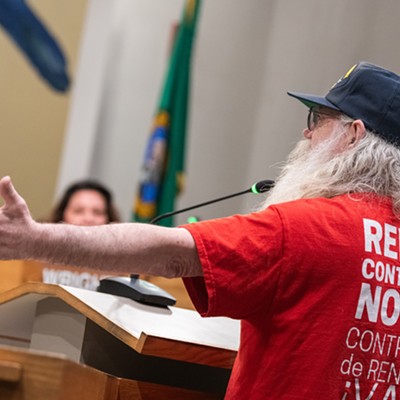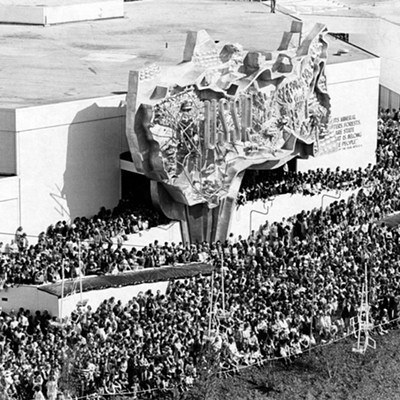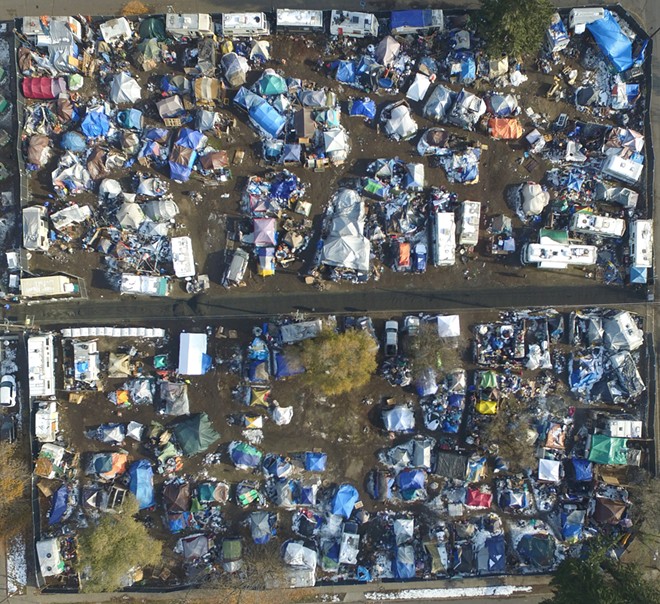
Who should be in charge of addressing Spokane's homeless crisis?
After three months and a mind-boggling amount of meetings, a trio of former city staffers think they may have found an answer: Eight experts and five local politicians. All united under a public development authority with access to millions of dollars in funding.
The proposal — if successful — could usher in a new chapter in Spokane's never-ending quest to address homelessness. It would see local leaders from competing jurisdictions give up some authority and independence, pool their resources and come together under a single entity.
The details of the proposal are still tentative, says Gavin Cooley, Spokane's former chief financial officer who has been leading efforts to regionalize a homeless response along with Theresa Sanders, a former Spokane city administrator, and Rick Romero, the city's former public utilities director.
The group's proposal stems from a 90-day "due diligence" period that aimed to bring community members and local jurisdictions together for a series of conversations about regionalizing Spokane's homeless response.
Those 90 days are about to end, just as state and city officials agreed to close Camp Hope, which has stood for 18 months in Spokane's East Central neighborhood as a visual symbol of the region's homeless crisis.
When local leaders signed on to the due diligence period back in February, Spokane City Council President Breean Beggs said he was optimistic about the discussions, but noted that it would "probably be a dicey day" when actual decision-making time came.
Ninety days later, Beggs says he's still optimistic and sensing bipartisan interest in the idea. But the time for abstract conversation is ending. Leaders will soon have to decide between giving up some of their authority and committing to a regional effort — or continuing to face the crisis alone.
"It's like everything, the devil is going to be in the details," Beggs says.
The regional entity is inspired by similar models in places like Houston and Seattle's King County.
One big lesson from Houston, Cooley says, is that decisions need to be guided by expertise — not politics.
"That means you end up with a governing board recommendation where the non-elected personnel on the board outnumber the elected personnel on the board," Cooley says.
Cooley and his group are proposing a governing board of 13 people.
Eight seats would be reserved for experts selected from various sectors: housing, medical/behavioral health, public safety, business and philanthropy. There are also seats reserved for "workforce," "lived experience" and the Continuum of Care Board chair.
Five seats would be for elected officials: A Spokane Valley City Council member, county commissioner, a small cities representative, the Spokane mayor or city administrator and the Spokane City Council president.
This, again, could all change. Spokane Valley "may or may not be ready to actually give up control of what they're doing," Cooley says, which could result in two seats going to the county commissioners.
Based on this year's budgets, the group is proposing moving roughly $36 million of homelessness and affordable housing money from Spokane County and the City of Spokane to the regional entity.
After the recommendations are presented, each jurisdiction will solicit public feedback and likely suggest its own changes to the proposal. To move things along, the volunteers are proposing that the jurisdictions pass ordinances adopting the public development authority within 60 days.
"We knew there were going to be some challenges," Romero says. "But so far so good. We feel pretty confident that we're gonna actually get this over the finish line."
"Camp Hope has been this galvanizing lightning rod for holding people's attention around homelessnes."
tweet this
The former city staffers plan to present their proposal to the public at the Spokane Convention Center on June 28. They'll also present to local politicians, who will then decide whether or not to move forward.
Two days later — 4 pm on June 30 — Camp Hope will close.
The timing is incidental, but still carries symbolic weight.
"Camp Hope has been this galvanizing lightning rod for holding people's attention around homelessness," says Zeke Smith, who has been overseeing outreach work at the camp with the Empire Health Foundation. "I do wonder if it could provide some momentum in this moment around the regional homeless authority."
The unsanctioned homeless encampment — which has dwindled from 600 campers to about a dozen — is slated to close under a court-ordered agreement between the City of Spokane and state of Washington.
Campers who are still there after the deadline could face arrest for trespassing, but Julie Garcia, who manages the camp with Jewels Helping Hands, is confident they'll be able to get everyone moved out before then.
The camp's closure may come as a relief to local leaders and the people who live and work nearby, but the region's larger problem is far from solved. Roughly 200 of those who've left since November are still unaccounted for, Garcia says. And the city's most recent point-in-time count found that Spokane County's homeless population increased 36 percent since last year.
Smith says he's hopeful about the prospect of a regional entity, but still waiting to see if the final proposal will address service providers' concerns about diverse representation in the governance process.
"If this process just redefines how the three jurisdictions collaborate or engage around homelessness, I don't think that goes far enough at all," Smith says. "Our partners are telling us they want to see authentic and real seats at the table."
If there's one thing everyone seems to agree on, it's that whatever we're doing now isn't working. Garcia says some sort of regional effort may be Spokane's best — or only — shot at addressing the conditions that formed Camp Hope in the first place.
"That's the scary part of all this," Garcia says. "If this regional authority doesn't work out, we stay on the same path that we're on right now, which is functionally bankrupt." ♦

